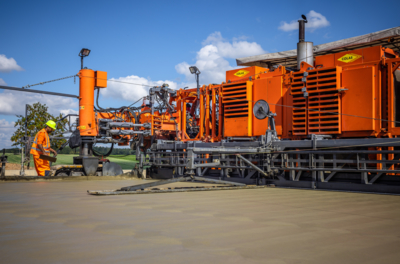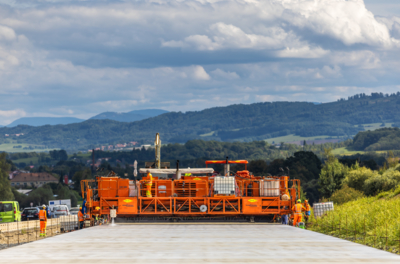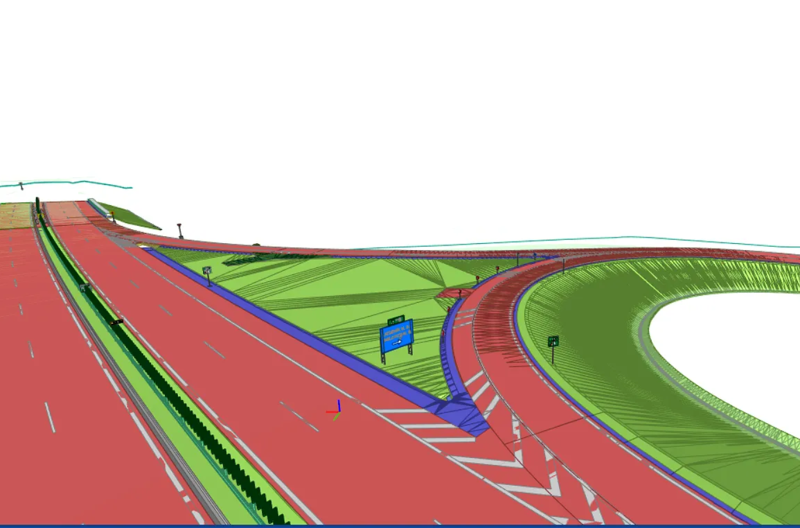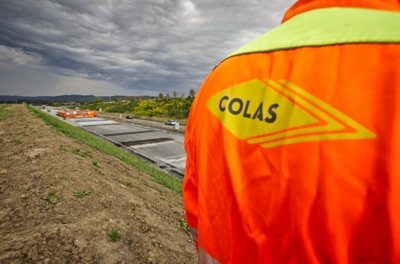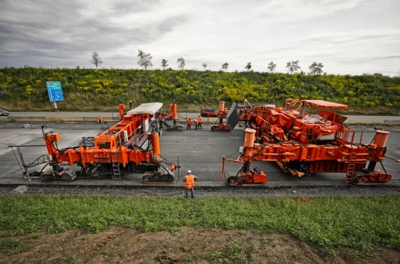Second Time on "Podbeskydská Magistrála"
24th October 2022
COLAS CZ, a.s. is building another section of D48 motorway. The four-lane road, which is currently not compliant with the standards, will become a fully-fledged and safe motorway, connecting the D1 with Poland once fully completed.
The Czech Republic is interwoven with "first-class" (according to Czech standards) roads. However, many of them do not have a good reputation among drivers and do not meet the requirements of their designation. The I/48 is one such road. The four-lane road, which follows the ridge of the Beskid Mountains and is a frequently used key connection of the Nový Jičín, Frýdek-Místek and Karviná Districts, is lacking in several aspects. The road was built between 1970 and 1987, but it does not meet the standard categories: there is no median strip and no place for an emergency parking. As a result, dozens of serious traffic accidents have occurred here, earning the I/48 the unflattering nickname "The Road of Death".
ŘSD (Road and Motorway Directorate) is therefore trying to gradually turn the I/48 into a full-fledged motorway. The thirteen-kilometre Bělotín – Rybí section is currently under construction, which is being carried out by COLAS CZ, a.s. and Firesta-Fišer. Underway since last June, this contract is a return to the Beskids for our company - a leading player in the field of road construction. In 2020, we had completed a twelve-kilometre-long section between Rybí and Rychaltice on the same road.
COLAS is mainly responsible for the construction of the earthworks, structural layers, drainage and cement-concrete pavement; construction of auxiliary roads; relocation of local roads; traffic signs; relocation of energy distribution lines and vegetation management. Supporting and retaining walls, as well as noise barriers, will also have to be built along the entire 13-kilometre stretch, covering a distance of 7.4 km. There are also twelve bridge structures on the route, the construction of which is being carried out by Firesta-Fišer. The construction also includes modifications and relocations of class III roads, which will be followed by the route of a non-tolled accompanying road, and which will enable immediate putting the area into service.
The construction began last June and the schedule is quite tight. The builders have 705 days for the first stage (Bělotín – Dub) and 905 days for the second stage. The construction is being carried out with ongoing traffic, with the I/48 operating in the two-way 1+1 mode with the top speed reduced to 60 km/h. The traffic on the railway line 270 (Česká Třebová – Bohumín), which is crossed over by I/48 via bridge, is not restricted in any way.
And how is the construction going? The relocation of utility lines – gas, water and fibre optic cables – has been completed. Our builders also had to dismantle the unused high-pressure pipeline, which was not included in the project documentation. "Work is underway on the structural layers of the roadway, we are working on the sewage and drainage, we have started laying the cement -concrete cover and the laying of compacted asphalt layers will follow. Piles for the noise barriers are being drilled. A part of the accompanying road from Bělotín was completed, so that bus lines could be relocated from the main route," explains one of our colleagues Petr Ćmiel, the head of the project. In the autumn, the builders will be re-directing the traffic to the accompanying road and a new bridge over the railway corridor. In addition, as in the previous section from Rybí to Rychaltice, construction is being carried out over the winter, i.e. without a technological break.
However, the two sections are not identical in terms of the location of the structure in the landscape. "While the previous section was mostly in a set-off, we are now building embankments that are up to 11 metres high. The most technically interesting part is perhaps the usage of gravel pillars in the underbed of the embankment, which are up to twelve metres long. Each pillar has a different length, depending on the geology of the terrain. We are building them where there are some of the highest embankments and their total length is 66 kilometres," adds Ćmiel. The total volume of ground works corresponds to this, with embankments more than doubling the excavations. The challenge, according to the project manager, was to secure the appropriate quantity of narrow aggregate fraction in the required quality and time. "The mobile sorting machine, which worked directly at the construction site, also came into play," concludes Ćmiel on our behalf.
For COLAS CZ, the return to the Beskids is yet another important reference in the field of motorway construction, and the volume of work ranks among the largest projects in the company's history. That being said, the D48 Bělotín – Rybí contract is also crucial for another reason: it is one of the pilot constructions in which our company will be testing the Building Information Modelling (BIM) technology, a digital modelling method that opens the way to better labour efficiency and cost savings. Thanks to a completely digital "twin", which is stored in the form of data on a remote server, all participants in the construction achieve a better overview of and control over the work performance. It enables a visualisation and it is not a static, rather a dynamic model with real-time automatic updates. The cloud-based solution also includes all data about communication between construction participants such as electronic construction diary, construction schedule, settlement of discrepancies, approval processes, inspections, revisions, etc. "The aim of the pilot project is to prepare a three-dimensional information model of the construction for selected construction objects; we also want to verify the BIM methodology in practice and understand its principles," says Dalibor Beneš, the Technical Director of COLAS CZ, further adding that the project on D48 is being carried out with the methodology and data standard given by the SFDI (State Fund for Transport Infrastructure).
The newly built 13-kilometre-long section between Bělotín and Rybí should be completed in 2023. It will be followed by the so-called "Palačovská spojka" (part of which already has a building permit) and also by a nearly four-kilometre-long section from Nový Jičín to Libhošť. These are further pieces of the puzzle of the gradual reconstruction of the D48, whose total length from a D1 slip-road to the Chotěbuz – Cieszyn border crossing will reach 70 kilometres. Upon completion of the full reconstruction, the road will have the parameters of a full-fledged motorway in the D 25.5/120 or R 25.5/120 category. Therefore, it is to be be a four-lane road where the opposing lanes are physically separated by a median strip. Instead of the existing connections and exits, there will be grade-separated intersections. With the contribution of COLAS CZ, a new, high quality and, first of all, safe highway will be created below the Beskid Mountains, which will significantly facilitate travel for drivers in the north-east of Moravia. Moreover, the reconstruction of the D48 has an important international aspect - it is a road included in the Trans-European Corridor of the TEN network. Once completed, the D48 will become a prominent motorway for Beskids as well as Europe.
